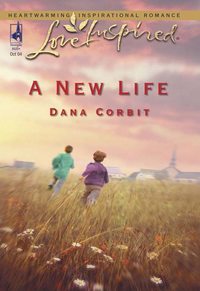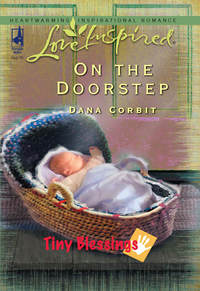
Полная версия
A Blessed Life

“It’s not a mansion, but it meets my needs.”
Serena could feel Andrew’s eyes on her as she took in the view of his apartment, but he didn’t try to interrupt her. His scrutiny made her neck feel warm.
Serena smiled, her flush creeping higher. “It looks great.” The simple awareness of him made her so uncomfortable that she scanned the room again for a distraction. Her gaze caught behind the door on a Harley-Davidson poster that seemed so out of character for the stereotypical youth minister she’d created in her mind. She got the feeling there was more to Andrew Westin than she’d originally guessed….
DANA CORBIT
has been fascinated with words since third grade, when she began stringing together stanzas of rhyme. That interest, and an inherent nosiness, led her to a career as a newspaper reporter and editor. After earning state and national recognition in journalism, she traded her career for stay-at-home motherhood.
But the need for creative expression followed her home, and later through the move from Indiana to Milford, Michigan. Outside the office Dana discovered the joy of writing fiction. In stolen hours, during naps and between carpooling and church activities, she escapes into her private world, telling stories from her heart.
Dana now makes her home in Grand Rapids, Michigan, with her husband, three young daughters and two cats.
A Blessed Life
Dana Corbit

Cast your burden on the Lord,
and He will sustain you;
He will never permit the righteous to be moved.
—Psalms 55:22
Dedicated to the little angels of my heart,
Marissa, Caterina and Alexa—especially to Caterina,
whose painful journey inspired this story. Also to
Randy, who makes me believe in miracles.
A special thanks to GDRWA and MMRWA
members, for endless support; to Melissa Baxter,
for always believing; and to Dr. Celia D’Errico,
D.O., and Dr. Hilary Haftel, M.D.,
for your answers and for your hope.
Dear Reader,
I started writing my debut novel, A Blessed Life, when my own heart needed healing. Like Serena, I have a daughter who lives with juvenile rheumatoid arthritis. I experienced some of the same guilt and hopelessness Serena feels and a similar joy when my child began to thrive. Also like Serena, I have struggled with giving up control to God.
I hope you enjoyed meeting the members of Hickory Ridge Community Church as much as I enjoyed creating them. Some of my favorite memories are from growing up as part of a large church family. Because these characters live on in my thoughts, I hope to meet them again in a future story.

Contents
Prologue
Chapter One
Chapter Two
Chapter Three
Chapter Four
Chapter Five
Chapter Six
Chapter Seven
Chapter Eight
Chapter Nine
Chapter Ten
Chapter Eleven
Chapter Twelve
Chapter Thirteen
Chapter Fourteen
Chapter Fifteen
Chapter Sixteen
Chapter Seventeen
Epilogue
Prologue
The waiting room stretched for miles in shades of warm tan and cheery peach, with pastel ocean scenes dotting the walls.
Every bit of it was a lie.
There was nothing sunny or happy about sitting in this sanitized holding cell. Not when Serena would have given anything to be on the other side of the wall…with Tessa. Instead she was forced to wait in here, helpless, while someone jammed a needle into her daughter’s hip, examining the bone marrow there, looking for the worst.
“If this is a charmed life, I’d sure hate to see a cursed one.” Serena didn’t care if the other parents and grandparents in the room overheard her mumbling. She squeezed her eyes shut but could still see her little girl, so far from her arms. At least the three-year-old was slumbering away her mother’s desertion and the medical assault on her body.
Unable to sit any longer, Serena stood and stretched her stiff legs, pacing the length of the room. She passed the television screen that had switched from a morning talk show to the midday news. Even the smell of this place—stale chips and soda—added to the nausea that had been building since this morning when she’d brought Tessa for her bone marrow biopsy—alone.
She stared by turns at the pay phone and her watch. Where was Trent? He’d promised to be here. This time at least…if none of the others. As frustrating as it was to admit, she knew if he walked through the door that minute, she’d forgive him for everything. For every time he’d failed her and their daughter since Tessa first became ill. Even for the indiscretions she suspected. If he’d be a stand-up husband just this once, she’d find a way to work through the rest of their problems. Finally, she gave in and dialed.
“Deirdre, this is Serena Jacobs again. May I speak to Trent?”
“I’m sorry, Mrs. Jacobs. Mr. Jacobs still isn’t in. I checked his schedule, and he’d planned to be out most of the day. Is there a message I can give him when he calls in?”
“Yes, please tell him I’m still waiting at the hospital.” She hung up the phone without waiting for the pleasantries.
Shuffling back to the upholstered chair she’d claimed as hers, she wrapped her sweater tightly around her shoulders. Outside, the July heat had turned southeast Michigan into a steam bath, but here inside, she was chilled to the bone. She fought the fog that was clouding her vision, but the tears came anyway, dampening her face before she could grasp for control.
Trent, please show up. Tessa needs you. I need you.
Serena pulled a tissue from her purse and dabbed at her eyes, ending up with a soggy tissue that had done nothing to stem the flow. Glancing up, she caught the other people in the waiting room trying not to stare.
She had to get control of herself. It would terrify Tessa if she saw her mother looking as if she’d just come from a funeral. In many ways she had, but that didn’t matter. Not now. Tessa needed strength from her parents, at least from the one who wouldn’t fail her. She straightened in her seat and rubbed her thumb along her lash line, clearing the smudged eyeliner.
No matter what the hematology oncologist told her today, she planned to stay strong for Tessa’s sake. Leukemia was an unlikely diagnosis; the physicians had made that much clear. They were only ruling out the last of the “ugly” diseases before they could trust their earlier suspicions. And those weren’t all that beautiful themselves.
Please, God, let it only be JRA. She stared at the floor, keeping her eyes open for fear she would pass out if she shut out the light. Her stomach clenched and sweat gathered under her bangs. What was she saying? Had she lost her mind? She shook her head. Here she wasn’t just hoping, but begging, that Tessa would have to live with a potentially crippling chronic illness like juvenile rheumatoid arthritis. How could she wish that on her own child?
But that answer was as simple as that most wonderful word she kept repeating like a mantra: life. No matter how difficult a diagnosis of JRA was, it, unlike several of the diseases the specialists had ruled out in the past few months, was something Tessa could live with. Recent medical advances even made it possible for her to have a high quality of life. Serena realized she didn’t have the luxury of worrying about levels of contentment yet. When she straightened, a renewed strength filled her.
“Mrs. Jacobs?” The anesthesiologist stood before her, waiting until she looked up. “Tessa’s in Phase One Recovery, which means she’s still sleeping, but I’ll go ahead and allow you into the PACU—that’s the post-anesthesia care unit—if you’d like to wait with her.”
When she reached the unit, Tessa was lying very still in the hospital bed, looking even tinier than when the anesthesiologist had taken her away. Her need to make physical contact with her child was so strong that Serena leaned over and brushed the mass of dark curls from Tessa’s forehead. She traced the line of thick lashes resting against the child’s cheek. Tessa started, showing she was returning to consciousness.
Serena pulled her chair close to the bed, leaned her head against the rail and poked her arms through the bars, simply to touch her daughter’s hand. She should not have allowed the doctors to take Tessa away. A better mother would have insisted, no matter what the hospital’s ridiculous rules, on being allowed in the operating room.
She might have been too numb to fight earlier, but she had to scratch her way out of this void now. Tessa needed her. That was the important thing.
Staring down at her little girl, Serena felt the lullaby they sang together each night come from somewhere deep inside her. “Hush-a-bye, don’t you cry, go to sleep, my little baby. When you wake, you will have all the pretty little horses.” She wanted to sing away all of the pain and the broken promise that she’d always protect Tessa.
The child awoke in slow, groggy increments, moaning as she returned from that dark place of unnatural sleep.
“Hi, angel-cookie. Mommy’s here.” Serena used the singsong voice that had always calmed her daughter’s bad dreams until now. But those visions had been only of monsters that inhabited closets or toys that made mischief. She wasn’t at all sure she had any remedy for Tessa’s very real nightmares today.
“Do you want Mommy to hold you?” She took that moan as a “yes” and lifted Tessa from the bed, wrapping her in a thin white blanket. The child’s gown was still unsnapped from when it had been removed for surgery, so Serena carefully closed the fasteners while she held Tessa close.
Serena had no idea how many minutes or hours had passed—only that she’d been exactly where she needed to be—by the time the hematology oncologist took the other seat in the curtained cubicle. Tessa had become more coherent but was crabby and was fighting against her bunny hospital gown. Her mother calmed her with touch and kept rocking.
“Has my husband checked in with you?” The question seemed to be her last defense, as it delayed the verdict a few seconds more. Could she live with the answer the doctors had tried so hard to find? She had to. Tessa would need her now more than ever.
“I’m sorry, Mrs. Jacobs. We haven’t heard from him, although we asked the waiting room volunteers to send him in when he arrives.” She smiled with a comforting expression that tinged a bit too much on pity. “I do, however, have some good news for you.”
Good news? Serena’s heart rate must have tripled. Her oxygen supply seemed to be temporarily blocked. While questions whirled through her mind, she was able to choke out just two words. “Excuse me?”
“The bone marrow biopsy shows that your daughter does not have leukemia.”
Chapter One
Twelve months later
Coming here had been a really bad idea. Turning around and heading home sounded like a perfect one. Serena hesitated a second longer before climbing the last two steps leading into Hickory Ridge Community Church. Once inside the heavy, twin glass doors and past the sanctuary, she headed up the stairs toward Andrew Westin’s office.
What had she been thinking when she’d set up this appointment last week? Why had it sounded so much better to visit with a youth minister? Even one who, because of his training as a clinical counselor, frequently met with church members to discuss problems. This way, though, she had not been forced to admit, even to herself, that she was going to a shrink.
Right now, the anonymity of a private counseling relationship sounded preferable by loads. If her parents were still living, or even if she’d developed some close friendships in her twenty-eight years, she wouldn’t be in this position. Then she would have had someone to talk to. More useless “what ifs.” What good had they done her so far?
Pushing forth with more confidence than she felt, she knocked on the door, hoping the youth minister had forgotten about the whole thing. Then she could forget to reschedule, and all would be well.
“It’s open,” said a baritone voice behind the door.
She shrugged. Well, at least the meeting was cost free. She used that thought to bolster her courage as she opened the door, plastering a smile on her face.
“Mr. Westin, I’m Serena Jacobs. We talked on the phone.” She crossed the room with her right hand outstretched, but he stood and met her halfway. Out of his usual Sunday costume of a dark suit, he was dressed in jeans and a beige polo shirt that offset his tan.
“Call me Andrew, Mrs. Jacobs. ‘Mr.’ makes me feel old.”
He gripped her hand with a firm shake that was just shy of painful. At five foot eight, Serena wasn’t accustomed to having to look up to anyone, but Andrew’s height of well over six feet forced her to lift her head to meet his gaze. He smiled down at her, though, and she found it easy to smile back.
It was the first time she’d seen Andrew up close, instead of across the church sanctuary where he and the Reverend Bob Woods sat, so she was surprised at how quickly he put her at ease. He probably had to take a whole class on that in his training for the ministry.
He sat in his upholstered executive chair, motioning for her to take the chair opposite the desk. Funny, he didn’t much fit the picture she had of a member of the pastoral staff, even if he wasn’t the church’s head minister. His sandy brown hair was a tad too long, threatening to curl at his nape. And his dress was too casual for a game of golf, let alone for what she’d come to expect of a church leader.
She lowered herself into the armless visitor’s chair. “Call me Serena. Mrs. Jacobs doesn’t…fit anymore.”
“Oh, I’m sorry. I wasn’t aware you were…divorced?” The way he stressed the last word made it a question. The sadness in his gold-colored eyes appeared genuine.
She nodded. “It was final just last week.” With nervous tension weighing on her and making it difficult for her to sit still, she looked about the room, conscious how plain it was. There were no pictures on the wall, short of Andrew’s Master of Divinity degree. The dark paneling shone with a recent waxing, but still it held no warmth. Even his desk was surprisingly clear of clutter, personal or work-related. No pictures of the girlfriend back home, of parents, a kid brother or even a Labrador retriever. It was odd to be opening her personal life to someone who didn’t seem to possess one himself.
“And that’s the reason for your visit?”
Another statement-question. She would get really annoyed if he kept that up. “No, I’m handling that fairly well—as well as anybody can handle failure.”
He didn’t respond immediately, but must have swallowed hard because his Adam’s apple jerked. She wondered if he had choked back a retort about her divorce.
“Then, what brings you here today?” Andrew leaned forward on his desk and steepled his fingers in a thoughtful pose. “I’m guessing from the way you always slip out the back door so quickly on Sunday mornings that it’s not to get to know your pastoral staff better.” One side of his mouth tipped up in a smirk, but his eyes twinkled to soften it.
A chuckle was out before she realized it was building. How long had it been since she’d laughed about anything aside from some of Tessa’s antics? It felt good, really good. “You guessed right.”
“Why don’t you give me a break and tell me what I can do to help you. I’m trained as a counselor and a youth minister, but I’m terribly under-qualified as a mind reader.”
Serena nodded and gathered all of her courage into a tight ball before tossing out, “I can’t seem to shake this depression.”
“Divorce will do that.”
“No,” she said, shaking her head so hard her neck ached. “The divorce isn’t what’s causing it, at least not all of it. My daughter’s condition is just getting to me. She has juvenile rheumatoid arthritis.” There. She’d said it. Strange how even admitting her depression aloud felt better than the guilt of keeping what she considered her selfish little problem bottled inside.
“I don’t recognize that one. Can you tell me a little about it?”
“JRA is a chronic illness where the patient’s body attacks her joints. There are three types of JRA. Only systemic-onset JRA—the rarest one and the type that Tessa has—can also affect internal organs.”
“What would that mean for her future?”
Serena leaped off into the rote speech that she used whenever anyone asked for details. If she kept it exactly the same—didn’t change a single word in her dialogue—she promised herself, it would feel no more personal than a memorized poem. Rather than a description of agony.
“In extremely rare cases, JRA can cause severe crippling and blindness, but we try not to think about those things.” She took a deep breath, trying to slow her racing heart. “With proper medication, most kids do very well. In fact, seventy percent go into permanent remission by the time they’re adults.”
“That must give you so much hope. How did you recognize that something was wrong?”
“It started about a year and a half ago when she began to have fevers every day—really high fevers that never turned to the flu or colds.” She folded her hands in her lap, trying hard not to wring them. “Whenever Tessa had them, she’d also get this rash on her hands. Fevers and rash are symptoms only seen with systemic JRA. It wasn’t until months later that she started having hot, swollen joints—the true arthritis.”
Andrew nodded. “You’ve been through quite an ordeal.”
“Not me. My little girl.” This was a mistake. She shouldn’t have come here. Talking about it wasn’t helping at all. It was only making her feel worse. “The illness itself is not the half of it. There were six months where the doctors didn’t know for sure what was wrong with her.”
She waited for Andrew to speak, to ask questions, but he only nodded for her to continue.
“They tossed around words like tumor, leukemia, tuberculosis and lupus.” With each word, the memories flashed through her mind more clearly. The screams from so many needle pokes. The fear in her child’s eyes that Serena couldn’t soothe. “She went through all kinds of tests—chest X rays, a ton of blood work, ultrasounds. They even tested her bone marrow for leukemia. We didn’t know for a long time if she would…live or die.”
The last was too much for her. A sob escaped her, though she tried with all her strength to hold it in. It wasn’t like her to lose control. She was usually better at keeping it all boxed in. But this time she couldn’t stop the tears from raining down her cheeks.
Andrew pushed a box of tissues to within her reach. When she looked up at him, he shook his head slowly. “And you wonder why you’re depressed? Look at all you’ve been through—not just your daughter, but you. The fear, the pain, the frustration. Not to mention a divorce, no matter how well you’re handling it. All of that adds up to some very explainable blues.”
She crossed her arms to hug away a chill, despite the July heat pouring through Andrew’s open window. “But it doesn’t make any sense. She was diagnosed a year ago. She’s even doing a little better lately. So why am I depressed now? Why not when she was going through all of the tests, when we had no idea what was wrong? Why not right after the diagnosis?”
Andrew shrugged. “Some people operate in crisis mode. During the most difficult times of their lives they simply handle whatever is happening without really sitting back to analyze it.” He leaned his elbows on the desk and rested his chin in the cradle of his palms. “It’s only when things are better that they can allow themselves to collapse under the weight.”
As if a lock suddenly had been fitted with a key, she felt a freeing click inside. “Maybe that’s what I’ve done.”
“Maybe. As well as all of the other changes in your life, haven’t you also just moved?” He waited for her nod. “Why did you pick Milford?”
“It’s fairly close to Ann Arbor, so I could take Tessa to C.S. Mott Children’s Hospital at the University of Michigan. There are only a few hospitals with pediatric rheumatologists on staff.” Her sacrifice had been small when she thought of the pain that Tessa faced daily.
“Did you find work here?”
“I’m a freelance writer. With a modem and my stable of regular contacts, I can live anywhere. Besides, Milford is such a quaint little village. And it’s clear across the state from my former husband and his new bride.”
He chuckled. “You’ve had so many changes in such a short period. Until now, you’ve hardly had the time to be depressed. Now that your world has slowed, you’re having these feelings, and I’m glad you’re talking about them. That will help a lot.”
Was there some neat little order that these feelings could fall into, like dividers that create order in a junk drawer? Somehow she doubted it. No, for once she was positive about something. It would never be that simple.
“I just feel so guilty.” She buried her face in her hands, allowing the blame to cover her like a dark, scratchy blanket. Seconds ticked by as she tried to tuck the feelings back into compartments where she could face them again. “For not being a stronger parent, for not being able stop Tessa’s pain, but, most of all, for mourning the loss of my perfect daughter—our perfect life.”
Andrew planted both hands on the desk, then lowered them and rocked in the chair. His actions confused her.
“What do you mean, perfect?” He pressed a crooked index finger to his lips.
She chuckled at both herself and his counselor’s pose. “I know it sounds silly, but I used to believe I led a charmed life. I had a good home, a nice family—everything anyone could ask for. And then the whole thing fell apart. Tessa got sick, and Trent cheated on me and left me for someone else. No more charmed life.”
He studied her for several seconds. “I wish I had met you several years ago.”
To her humiliation, the skin on her arms began to tingle. She couldn’t allow herself to consider how meeting a nice guy like him years earlier might have changed her life. She rubbed her damp palms down her skirt, resisting the urge to smooth her blouse, as well.
“Why is that?” She choked out the words.
“Because this is what I would have said to you then—‘You believe your life is charmed? Just wait, because nobody gets out of here free.”’
Serena chuckled. How right he was. “And I wouldn’t have bought a bit of it back then. It’s only now that I would have realized you were a genius.”
“If we’ve just met and you think I’m a genius, then we’d better avoid getting to know each other better. I’d hate to see my I.Q. plummet in your mind.”
She laughed again, a real, honest laugh that felt wonderful. And to think that lately she’d wondered if she would ever laugh again. He was so easy to talk to. And he made her feel as if everything was going to be all right—for the low, low price of free.
Andrew tapped his fingers on his desk a few times until she finally looked back at him. “It’s okay to feel sad, you know. About Tessa’s illness. About the divorce. Even about the loss of your charmed life.”
“Then, why do I feel so guilty about being sad?”
“This is just a guess, but I think you’re used to being in control. You haven’t been able to control any of these things, and it’s making you crazy.”
She raised an eyebrow. “Crazy? Is that a word a counselor should be using?”









